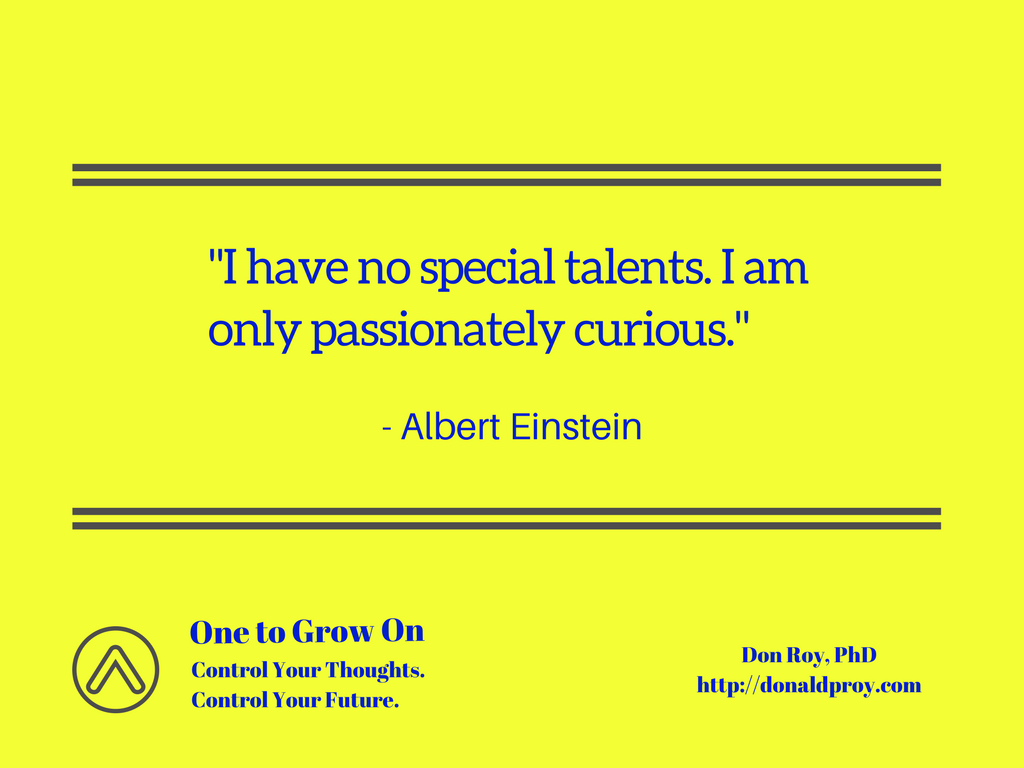How do you see yourself? Is the way you see the person in the mirror the same as how the world sees you? Sometimes, a wide gulf exists between perception and reality. A very smart person reminded me of this difference. That smart person was Albert Einstein. He once said “I have no special talents. I am only passionately curious.”
If Einstein had no special talents, is there any hope for the rest of us? His name is synonymous with intelligence, scientific rigor, and talent. Yet, in his mind he had no special talents. One of the most distinctive personal brands to walk the earth was not lacking in talent, as he suggested. But, he possessed a greater gift that led him to accomplishment: curiosity.
Why Curiosity Matters
All great accomplishment comes from an unease or dissatisfaction with the status quo. We question whether things could be different or better. Then, if the discomfort is significant enough we embark on a journey to come up with a solution. Alternatively, we could turn away from the current situation and let it remain as is. Growth requires a willingness to accept risk; curiosity is a form of self-permission to pursue accomplishment.
Curiosity is at the root of this transformation. If we are unwilling to question why we accept things as they are, what an alternative would look like, and how to get to that alternative state, we will continue to reside in a comfort zone. The digs are nice, but who knows, we could be in a much nicer “neighborhood” if we allow curiosity to work for us.
Build Curiosity Muscle
Can you become better at allowing curiosity spark personal growth? I hope so because using curiosity to spur growth is a personal weakness of mine. Years of conforming to rules and systems will do it to you. Conformity and curiosity can be at odds sometimes. It is a relief to realize curiosity can become a personal growth tool rather than a liability.
I recently read an article on curiosity by Donald Latumahina. In the article, he discusses why being curious is an important personal trait and how you can develop it. Four tips for becoming more curious stood out:
- Keep an open mind. This practice can be harder to follow today as we can fall into an echo chamber of reading and listening to like-minded people. Embrace other perspectives if for no other reason than to deepen your understanding of other people.
- Don’t take things for granted. “It has always been done this way” is not the best justification or guideline. Be willing to consider if there is a better way.
- Ask questions. Make questions of Why? When? Where? What? more prominent in your vocabulary. I wrote a post on the importance of asking questions in our personal growth. Leveraging curiosity is one of the most important roles asking questions can play.
- Learn from different sources. We can deepen our understanding of the world around us and spark curiosity by broadening our information sources. Don’t limit learning to the same newspapers, magazines, or websites. Moreover, don’t limit learning to sources from one field or industry. If you are an accountant, make a point to read works about architecture. We can learn from other fields and question assumptions we make about our own field.
Grant Permission
What I learned from reflecting on the role of curiosity in personal growth is simple: I must give myself permission to be curious. You have heard the saying “curiosity killed the cat.” That thought does little to encourage curiosity. Although some people may be naturally more curious than others about the world around them, the good news is we are not limited to a natural inclination to be curious. We must overcome indifference and apprehension and be open to what we can learn about people and the world around us.


